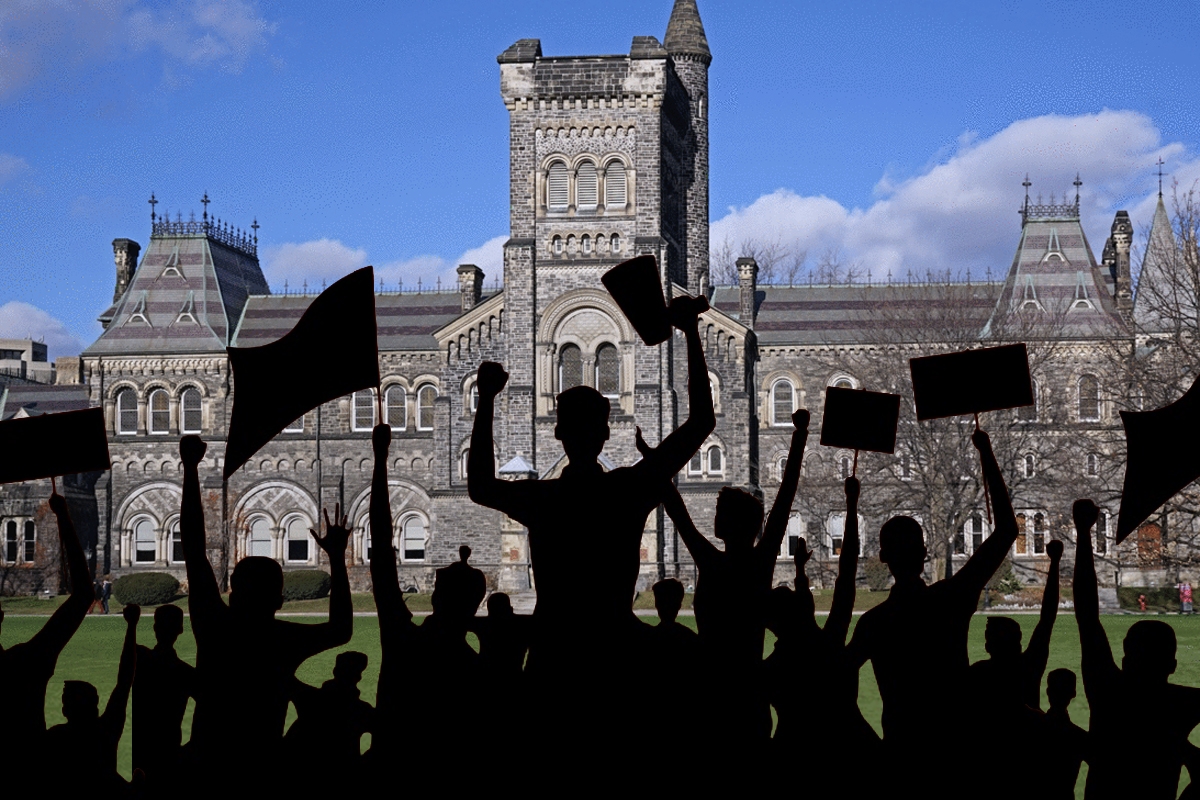
Free speech and academic freedom in universities: Challenges and a solution
Our universities are designed and funded to be more than institutions for teaching. They have long served as the incubators and testing grounds for ideas. But now, in much of the developed world, the universities are experiencing some challenges in maintaining the practices of free speech, open debate and academic freedom, all of which are needed to allow ideas to be tested in the crucible of experimentation, peer review, open discourse and reconfirmation.
And some of the controversy over what can and cannot be said on campus these days is due to the confusion between and conflation of two different concepts: free speech and academic freedom. They are not the same at all.
Free speech is not confined to the universities, but rather is the notion, throughout a free society, that the government cannot punish you for speaking your mind. Exceptions to this rule are very narrow, largely prohibiting speech which is an incitement to physical harm of others or damage to their property. Free speech, however, is not without consequences for the speaker. You can be fired for its exercise if your employer feels that a loyalty line has been crossed, and you certainly may risk being sued, shunned, and/or insulted or otherwise disadvantaged from its exercise. But that is as it may be. You cannot be jailed for it. The consequences of free speech for the speaker, if any, are all in the civil or social domain.
Parenthetically, the idea that the exercise of free speech may have consequences for the speaker was always based on the notion that the speaker was identifiable. There never was the concept of free speech while wearing a disguise, which is why we struggle so to deal with many of the platforms on the internet which purport to be providing for free speech, but which are really just vehicles for intimidation, since they are indeed amplified speech with no identifiable originating speaker.
Academic freedom is different, in that it applies only to scholars employed by institutions of learning, and does bar the employer from taking action against its employed faculty members for exercising it. To be fair, the universities of North America have not always been entirely receptive to and protective of the broadest reasonable range of discourse. Academic freedom was actually institutionalized quite late. Its formalisms derive from the AAC/AAUP declaration of 1940, which is the originating root of all academic freedom policies in universities in both the USA and Canada. In Canada, the principles of that declaration underlay the reactions to the cases of Frank Underhill (1941) and Harry Crowe (1958), which are the most cited Canadian early cases. Academic freedom is the freedom to research, publish, and speak publicly in one’s area of expertise without institutional constraint or sanction, and hence goes further than free speech, but only for a limited group of people. It also implies its twin, academic responsibility, which includes an obligation to eschew provable falsehoods, to use reasoned arguments and actual data, and to avoid purporting to speak for the institution unless delegated to do so.
There is quite a bit of useful jurisprudence about academic freedom in the US, and much of it derives from the Pickering case and its sequelae (Pickering vs Board of Education 391 US 563 (1968) SC). Essentially, the Pickering Test means that academic freedom can even be used to protect speech which does some harm, provided that the matter being spoken of is a matter of public interest. In this it differs from ordinary free speech, which, if it does harm can readily be a cause of action at law. Since the inception of the Charter of Rights and Freedoms in Canada, it is reasonably easy to argue for the applicability this sort of US precedent in Canadian courts, but a number of high-profile post-WWII academic freedom cases in Canada had already laid a solid groundwork.
In the three generations since academic freedom became a touchstone value of the North American Universities, it has caused those institutions to become the clear world leaders in the generation of new knowledge. A cursory look at the distribution of Nobel Prizes would be a pretty convincing indicator.
But today academic freedom and open debate are experiencing some non-trivial setbacks, though mostly not in the experimental disciplines. The targets in the cross-hairs are largely in the encyclopedic disciplines. Debate in the humanities and social sciences is becoming more and more constrained by a new orthodoxy which has developed an interesting technique for protecting itself from challenge. It is the technique and culture of the taking of offence, or perhaps the feigning of the taking of offence, at the expression of views different from one’s own. And indeed, sometimes the taking of offence extends to claiming that the “offending” speech is itself violence. This hugely trivializes real violence.
We now see speakers who are scholars being shouted down for holding to “unapproved” views, or being prevented from speaking on campuses because university administrators, fearing repercussions, impose vast “extra security” costs on the entity wishing to invite the speaker, and therefore using economic clout to prevent such discourse.
It was not always thus. I fondly recall my time as an undergraduate and graduate student at the University of Toronto in the 1960’s. A debate was arranged in Convocation Hall between Wm F. Buckley Jr. and David Lewis. For those who don’t recall, David Lewis was Canada’s leading socialist, a former Rhodes Scholar and former head of the Oxford Debating Union, and later the leader of the social democratic party he had helped to found, the New Democratic Party. I was a Lewis fan, and he was a personal friend and mentor as well, and Buckley was considered by most Canadians to be extraordinarily far to the right. That being said, the audience was entirely respectful and it was a brilliant debate between the two best debating stars of their generation. Though agreeing with most of what Lewis said, my take on the event was that Buckley won the debate on points. It was a damned good lesson for me. Listen to the other side. Even in your disagreement you will likely learn something.
Another interesting event during that time was the mass teach-in held by the University of Toronto and York University at Varsity Arena in Toronto in the fall of 1965. The teach-in movement had begun in the US as an intellectual activity of the anti-war movement opposing the Vietnam War. But despite the fact that all the organizers were anti-war, the Toronto organizing committee opted for a non-partisan exchange of expert views. Before an audience of up to 6,000, the speakers all got a respectful hearing. The long roster of speakers was blue-ribbon all the way. We were charmed, of course, by Chester Ronning, the very progressive, very articulate Canadian ex-diplomat and China expert, who had been born in China. But we listened attentively as well to the “realist” Polish-American strategist Zbigniew Brzezinski, who, despite his brilliant career in US foreign policy, was a hawk on the subject of the Vietnam War, and on that score ended up on the wrong side of history. Nobody was shouted down.
But today that would not happen. And it is not only voices of the hard right which are shouted down, chased off and stigmatized. Even social scientists near the center who may have adopted an intentionally strident style are routinely given the same treatment. Dr. Jordan Peterson is the current obvious example of this. Similarly, pro-Israel speakers or even just Israeli visiting scholars also often get the bum’s rush, and Jewish student organizations get dropped from lists of student-government-approved university clubs. And with the abortion debate, especially in the US, it is even more chaotic, with some venues driving out speakers advocating access to abortion and others driving out speakers favoring bans on abortion. Somehow, it appears that our institutions of higher learning have become terrified of the injury that their students and researchers may suffer if they accidentally hear the voices of “the other”, whatever that other may be at any given moment. But appearances may mislead.
For those leading the movements and demonstrations which suppress speech, they do so not out of fear but as a calculated tactic in an ideological battle. They have no stake in free speech, academic freedom or open debate. They are committed campaigners, happy warriors with certainty in their hearts and confident in their righteousness. In their minds, the suppression of the offending speech is their duty. Tomas de Torquemada would be proud of them.
This determined attempt by committed campaigners to silence those who disagree with them by disruptive protest does not make the political and social opinions of the protesters automatically wrong. Indeed, in some cases the political and social views of the protesters are quite progressive and have much to commend them. But their methods and tactics are completely wrong, and threaten to destroy the universities. Why do the universities themselves not resist more forcefully the current popular tactics of suppression of speech?
The short answer to that question is failure of administrative courage when faced with disruptors in the academy. There are good cultural reasons why this occurs with frightening regularity. Some of the factors which tend to trap university senior administrators into inaction are dealt with in a report I wrote in 1994, and which remains relevant. In that year I was commissioned by Concordia University to conduct an inquiry into Concordia’s long-term handling of Dr. Valery Fabrikant in the 13 years before he committed the murder of four colleagues. The report is widely available (just enter “Lessons from the Fabrikant File” into your browser). I conducted the inquiry and wrote the report in the months after Fabrikant’s conviction for the murders, but it focused on the problems the institution experienced with him in the many years leading up to those events. In retrospect, it is a case study in how very accomplished good people with good values can fail to appropriately constrain disruptors in the academy.
That report touches upon one of the two key factors which hampers decisive action by senior university administrators, and that is that most of them have little training to administer. They frequently were elevated into their administrative roles for being fine scholars and teachers, and the above-mentioned report does set out why they sometimes do not acquire the skills, conditioning and ethos that they will need in their administrative roles. Yes, despite their intelligence, integrity and good intentions, senior university administrators can sometimes look like the laboratory exercise for teaching the Peter Principle. No surprise, then, that many hesitate when faced with some chaos on campus.
The second key factor is, regrettably, how university boards have been selecting university leaders of late. I’ve spent much of my career amongst university presidents and principals, and, while the group is blessed with plenty of extraordinary people, there has been a recent trend to select folk who have never offended or annoyed anyone. Interestingly, people fitting that description may either be highly articulate extraordinary peacemakers blessed with powers of persuasion, or folk who are uncourageous and determined to do nothing controversial. One always hopes to appoint people from the first bin, but the supply is limited, and sometimes folk from the second bin are selected. Hence today a non-trivial fraction of such senior administrative posts go to folk who are determined to please everyone. It can’t be done. A determination to respect everyone would go further. And that sort of determination would lead to university senior officers who would have no regrets about barring from campuses those who challenge rights to speech, open debate and academic freedom. I personally barred plenty of folk who were disruptive or intimidating from the three universities where I had that authority, and not only kept my job, but found that some of the disruptors then adopted more fitting tactics as a result and, when I allowed them to return, they became markedly better members of the academic community. On rare occasions they even thanked me for steering them in a better direction.
I do understand, however, that even the best university leaders have some concern that if they show an even-handed resolve to maintain order on campuses while allowing the maximum expression of views to the extent permitted by law, their boards may not back them up. A good plan might be to talk through that possibility with the governing board before any incident has occurred, so that there is an understood consensus on a suitable response. And then boards must give the university leaders some maneuvering room, rather than having a plan of action that is too rigid and constrained.
Furthermore, if university leaders as a group, at the national or provincial/state level, resolved collectively to act similarly on such matters, so as to create a common front, boards would be more inclined to back them to the hilt, because for explanation they could properly attest that they were merely adhering to a widespread sectoral policy. Such collective reinforcement could help to restore administrative courage.
Shouting down or physically intimidating or attacking scholars in order to prevent them from speaking in any venue is bad enough. On a university campus, it is analogous to the burning of books that was a signature act of the Third Reich and of other intolerable regimes. Any university administration that thinks this is the new normal has lost its soul, and in the process has lost any reasonable claim to support from the public purse.








